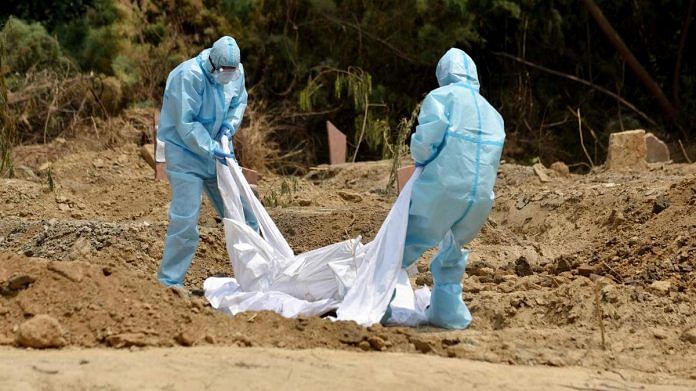New Delhi: It took over a month and a high court order for 26-year-old Abdul Kalam’s family based in Uttar Pradesh’s Kushinagar district to get his body flown from Jordan to India so that it could perform his last rites.
Kalam, an Indian migrant labour in Jordan, died on 4 November due to Covid-19. Keen to personally bury his body in India, his family requested the Indian embassy in Jordan to repatriate the body.
However, the family was forced to approach the Delhi High Court on 3 December, after it was informed by the embassy that the cargo agency at the Delhi airport had refused to handle Kalam’s mortal remains.
This week, arrangements were finally made to repatriate the body pursuant to the court’s 7 December order, in which the Delhi International Airport Limited (DIAL) was told to appoint an officer to be in touch with the family’s lawyer in Delhi so that all formalities are completed in time.
Before the court, DIAL made a statement that it did not have any objection on the body’s repatriation. Since DIAL undertook to bring the body back, the court did not keep the case pending and disposed it off on the first date of hearing with directions to DIAL.
Advocate Subhash Chandran, who fought the case on behalf of the family, told ThePrint that after the court order, things moved fast.
“On 9 December the Indian Embassy shared with us the airway bill that was issued to transport the body to Delhi on 10 December. The body was finally cremated on the morning of 11 December for which the family drove down to Delhi,” he said.
Also read: Madras High Court ends Income Tax proceedings against Karti Chidambaram, wife
What the family did
Kalam’s brother-in-law Irshad Ahmad told ThePrint that his parents were informed about the death on 4 November. With the intervention of the International Labour Organisation’s Jordan office, and the Indian Embassy, the employer had also agreed to meet the expenses for sending the mortal remains.
According to the family’s petition in the Delhi High Court, the embassy had completed the formalities and Emirates airline agreed to carry the body from Amman to Delhi airport.
At the embassy’s request, Kalam’s parents also authorised a Delhi resident to receive his mortal remains, Chandran said. This was duly informed to the embassy on 18 November.
According to Irshad, Chandran also helped the family contact the NGO, Shahid Bhagat Singh (SBS) Foundation, to handle, transport and cremate Kalam’s body. This was done after the authorities in Delhi on 26 November told the family to do so.
SBS is said to have transported and cremated more than 500 Covid-positive dead bodies.
While all formalities were completed, the family received a call from the embassy towards the end of last month, informing them that the airport in Delhi had not given its clearance to receive the body. They were also told that SBS volunteers were denied permission to receive and transport the body.
Irshad said the family was told this over the phone and there was no formal or written communication. Thereafter, the family filed a writ petition before the HC on 3 December.
The insurance issue for migrants
P.M. Jabir, who is the welfare secretary of the Indian Social Club in Oman, a recognised body of Indian diaspora there, and closely followed Kalam’s case, said this reflects the plight of Indian migrants living in Jordan.
“Families of migrants working here do not have the wherewithal to pursue the authorities in case someone falls ill and is hospitalised. Kalam’s case is an exception, since the employer and the airline agreed to undertake the expenses to transport his bodies,” he said.
“There have been instances where bodies have not been released from the hospital for non-payment of bills,” added Jabir.
Indian migrants are often helped by the Indian diaspora living in Jordan, he said. “Non-availability of insurance for Indian migrants leaves them in state of helplessness,” Jabir added.
Also read: Delhi High Court stays CIC order directing IAF to give details about PM’s foreign trips



